'Outrageous' TV show review
Why the Mitford Sisters persist in fascination and people's imagination ...
There’s this Tumblr lore that every girl has at least three historic obsessions … just little fascinations we hyper-fixated on as children and have these factoids at our fingertips from countless books, documentaries, exhibits, and Google searches we’ve conducted over our lifetimes;
For me, it’s probably; The Romanovs, Radium Girls, and the Mitford Sisters.
Who were they? I am so glad you asked (pulls on history-nerd goggles) especially because there’s a new TV show all about them, called Outrageous and it’s based on one of my favourite non-fiction books about them, The Mitford Girls: The Biography of an Extraordinary Family by Mary S. Lovell. Available on Britbox in Australia.
If you don’t have time for all that, just watch this amazing mini YouTube documentary that is legit *incredible* as a summary of them;
But basically; they were an aristocratic British family who were raised incredibly isolated from the rest of the world (their father - a 2nd Baron - refused to let his daughters get a formal education because he didn’t think it suitable) - but they became particularly well known in the 1930s for being a microcosm of changing politics of the time in the lead-up to World War II … imagine; the popularity and fascination of The Kardashians, but with more close-association with the biggest political figures of the time;
Nancy Mitford - was an author, and has become more notorious over time as her novels have become classics and are incredible texts for capturing the zeitgeist of the period and explaining her unique family. Her works are considered semi-autobiographical; like The Pursuit of Love (which was adapted into a miniseries recently) and Love in a Cold Climate. She was also a biographer of historical figures, including the Sun King. She never had any children, but her novels have well and truly carried on her legacy. If you’d like to get a taste for her talent, The Pursuit of Love is a *really* good adaptation (Andrew Scott is in it too!)
Pamela Mitford - often called “the rural Mitford” she loved farming, and as children their father made all the girls run the Mitford estate stables and small farm … eventually Pamela got sick of doing this work for pittance; she went around to all the local farmers to find out what they paid farm-hands, then convinced her sisters to unionise and strike with her until their father paid a competitive rate for their labor. She’s the most low-key of the Mitford’s, later in life she divorced her husband and lived the rest of her days with Italian horsewoman, Giuditta Tommasi (yes, they were lesbians - not just very good friends.)
Diana Mitford - she was considered the most beautiful of the sisters and much was expected of her, especially after she made a good match by marrying a 2nd Baron in 1929. But the marriage quickly fizzled and ended in divorce, mostly because Diana was bored stiff - and because she met and fell in love with Oswald Mosley, the then leader of the British Union of Fascists (BUF). Now, in 1933 when they got together the political concepts of “fascism” and “Nazism” were still fairly new - hinging greatly on nationalism and patriotism … but both quickly revealed their true violent, racist, and tyrannical undercurrents. By the time WWII started, Diana and Mosley had long been vocal supporters of Hitler - so much so that MI5 recommended the two of them be arrested and detained without trial, at Holloway Prison … which they were, from May 1940 until November 1943. While imprisoned they sunk further and further in the public’s esteem, and by the end of the war they were among the most hated people in Britain. But neither of them repented for their past politics, and lived out the rest of their days in elegant disgrace.
Unity Mitford - definitely the strangest of the sisters, and even compared to Diana - Unity became the more pathetic and reviled. As a young girl, Diana introduced her to Mosley’s BUF and from her fanatical interest in fascism she quickly discovered Hitler and became obsessed with him. Their parents had allowed each of the girls to have years abroad (mostly in France, to broaden their minds) but Unity campaigned hard to be allowed to spend hers in Munich, Germany - which was granted. From there her obsession grew; she’d go to the Osteria Bavaria restaurant every day, because Hitler and his cronies would occasionally dine there … it got to the point where Hitler noticed her, discovered she was from an aristocratic British family and invited her to dine with him. They became friends - and Unity would write to her sisters about how she’d sit at his feet and listen to his stories while he sat in a chair and stroked her hair (blergh!). When Britain declared war on Germany in 1939, Unity was so distraught at her two beloved countries becoming enemies that she took herself to the English Garden in Munich, and shot herself in the head … only; she missed. Managed to survive with permanent brain damage. Hitler evidently did have a soft spot for her, because he was discreet about her injury and arranged for her to be returned home to England and her family in the midst of the “phoney war” period … where she lived out the rest of her days in pain, with the mental-capacity of a child, until she died from related complications at the age of 33.
Jessica ‘Decca’ Mitford - My personal favourite of the Mitford Sisters, she was the closest in age and friendship to Unity and the two of them shared a room growing up … but where Unity chose fascism and nazism, Decca became a communist (apparently the girls had warring posters; Karl Marx for Decca, Hitler for Unity). Around the same time that Unity was meeting Hitler, Decca eloped with Esmond Romilly (Winston Churchill’s nephew) to Spain to participate in the Civil War; they subsequently moved to the United States where Romilly proceeded to join Royal Canadian Air Force … and during an air raid on Hamburg in 1941, Romilly's aircraft was lost over the North Sea and all on board perished. By this point, Decca’s sister Diana and her husband Mosley were imprisoned in Britain for their Nazi-leanings and Decca was furious that they weren’t being more severely punished (potentially even executed as traitors). She remained in America and did eventually remarry; and then later in life she became an investigative reporter … She wrote several volumes of memoirs and several volumes of polemical investigation, including the best-selling The American Way of Death (1963) uncovering the predatory practices of the funeral industry at the time, which completely changed the way people in the West viewed death (she’s largely attributed with ushering in the popularity of cremation over traditional burial, and even John F. Kennedy was greatly moved by the book which he read shortly before his death - and it’s attributed with how progressive his funeral would become, compared to past Presidents and their lying in state.) She was the grandmother of James Forman Jr. and Chaka Forman, sons of the African-American civil rights leader James Forman by her daughter Constancia Romilly.
Deborah Mitford - some may say the most boring of the sisters; she’s mostly well known for having married the Duke of Devonshire, and with him turned his ancestral home Chatsworth House into one of Britain's most successful stately homes. Chatsworth now hosts Jane Austen Pride and Prejudice outdoor screenings and events though, so that’s something! But she is mostly known for the many articles about how rich she was.
Tom Mitford - oh yeah, there was also a brother. He was bisexual and had affairs with both James Lees-Milne and Tilly Losch … But he was no bisexual king; he supported the British fascism movement along with Diana and Unity, and was a fan of Hitler - so much so, that when war broke out Tom chose to serve in Italy and North Africa, and then in Burma, because he did not want to fight against Germany. He died in 1945 in Burma.
Undoubtedly they were a fascinating family; both for their inherit glamour, and that they seemed to be at the centre of change in the War-era. Many people have hit on this intrigue and found new and dynamic ways to tell their story. Like Jessica Fellowes having a cozy historical mystery series in which the sisters alternate as narrator across six books … eh. I’m less enamoured of this series (because - genuinely! - who wants to be in Diana or Unity’s head?!). I’m actually grateful that the first television series *about* the family, have opted for nonfiction over fiction …
Outrageous
That brings us to the TV show Outrageous, based on the aforementioned nonfiction book The Mitford Girls by Mary S. Lovell with screenplay by Sarah Williams.
The series utilises Nancy Mitford as the more prominent storyteller and thus narrator to her sister’s shenanigans - and her own shambolic life (she had a rotten first husband, and didn’t enjoy literary success until much later in life and many books into her career).
Critically, the TV show only covers the period of the 1930s in the Mitford’s lives - very much laying the groundwork for their political and romantic leanings … already there's been questions about Season 2, to actually cover the war-period when there’s so much more upheaval in their lives, and Europe. Actor James Purefoy (who plays their father) has said they’d be “mad” no to continue the tale of the Mitford’s with a season 2, and I completely agree.
You could argue that they should have just given audiences everything in one serve - make it 12 episodes instead of 6 and get it all out in one go … but I think this was quite expensive to make (the costumes alone are fabulous; and to emphasise the fashion Ghost London have put out a collaborative Outrageous collection) - so I think to get it done *right*, they were correct to split it. Also because a second season emphasises that there truly is so much to the Mitford’s lives, far more than a single season of television can deliver on … and presumably a second-season that shows active war (and the London blitz amidst it all) will blow the budget out even more - so they must have to conserve their energies and convince producers that they need more $.
I think the creators have also done well to prioritise Season 1 focusing on the relationship between the girls; before we see their family split in half and be divided along political lines and beliefs, we first have to meet and get to know them as a whole … how close they were; the ‘alliances’ between the girls according to their birth-orders, their individual hopes, dreams and fears.
In telling each of the women’s stories, the show is revealing the history of the times too … exactly how the British fascists rose in power (‘Battle of Cable Street’ when the police beat anti-fascist protesters, because - frankly - ACAB), the slow-leak of information about what Jewish people in Germany were going through (there were signs, there were articles and the rising antisemitism was definitely recognised and commented on - but it didn’t move anyone to action, overly.)
Season 1 is all foreshadowing, in a way - we, the viewers, know what’s to come of these new-to-the-Mitford’s terms of ‘Nazism’ and ‘fascism’ but it is fascinating (and frightening) to get a blow-by-blow of these political events unfolding in “real time” throughout the 1930s. I think it does well for a modern-audience, to be forced to go slow and realise the insidiousness of these politics in everyday life for the 1930s, what actually led to WWII (because I think our pop-culture have given us *so much* of the war years and aftermath, and not nearly enough of what can help us navigate current-times and see parallels to our own lives).
Look, because some of the sisters are less colourful than the big movers-and-shakers like Decca, Unity, Nancy and Diana - some of the stories do feel shoe-horned (sorry Pamela and Deborah) but I think the show still does well to highlight the closeness of the family, and just how fascinating their lives were to outsiders. Also that they were an aristocratic British family very much swept up in the post-WWI social-class upheavals, and they had fallen from financial favour - showing their mother and father struggling with this truth was interesting, and honest to the Mitford’s real dilemmas … it also provides personal background for some of the family, who were enamoured of the very patriotic fascism movement that promised them a return to grace - that they were owed something that is being withheld or stolen from them.
I think this is a great introduction to the Mitford’s, but you should be warned that Season 1 doesn’t yet cover the really good and juicy stuff. For that, we’ll all have to hope for a Season 2 - or in the meantime there’s a *wealth* of reading you could do. Books by the Mitford’s themselves (Nancy and Decca especially), about them or inspired by them.



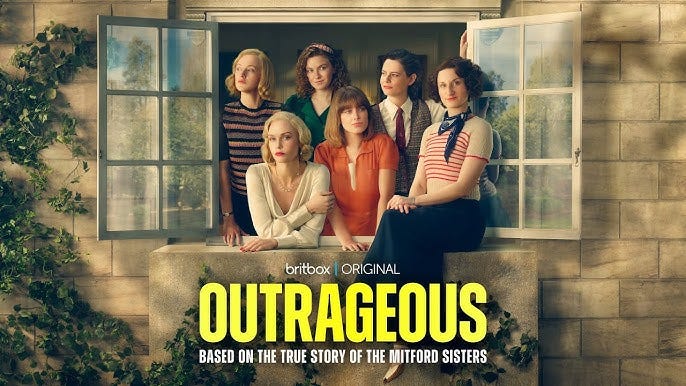
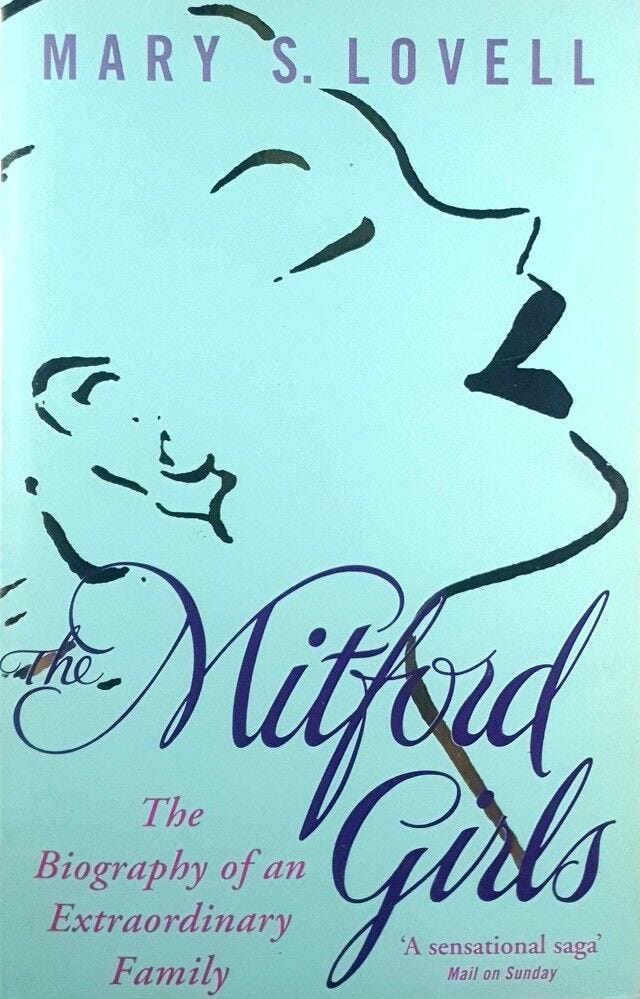

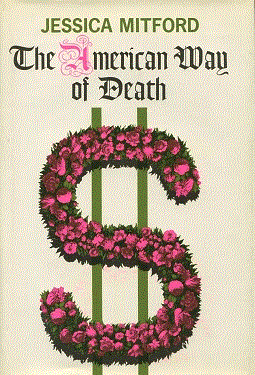
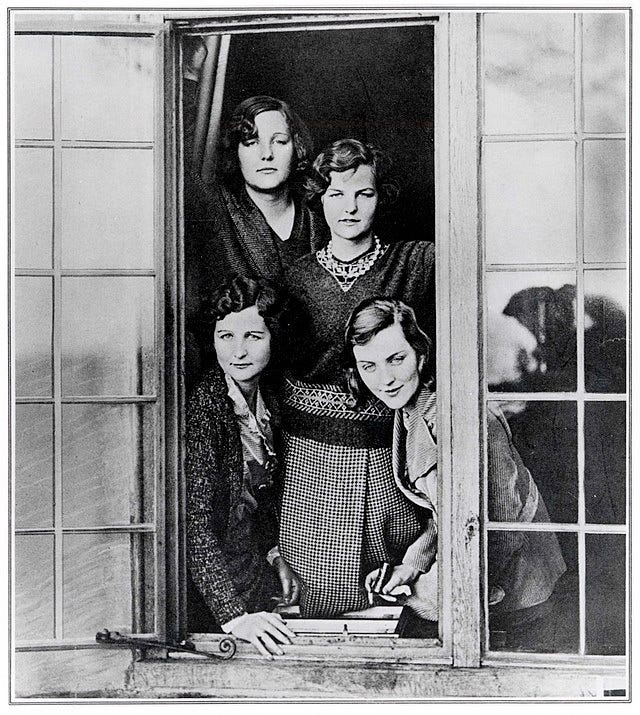
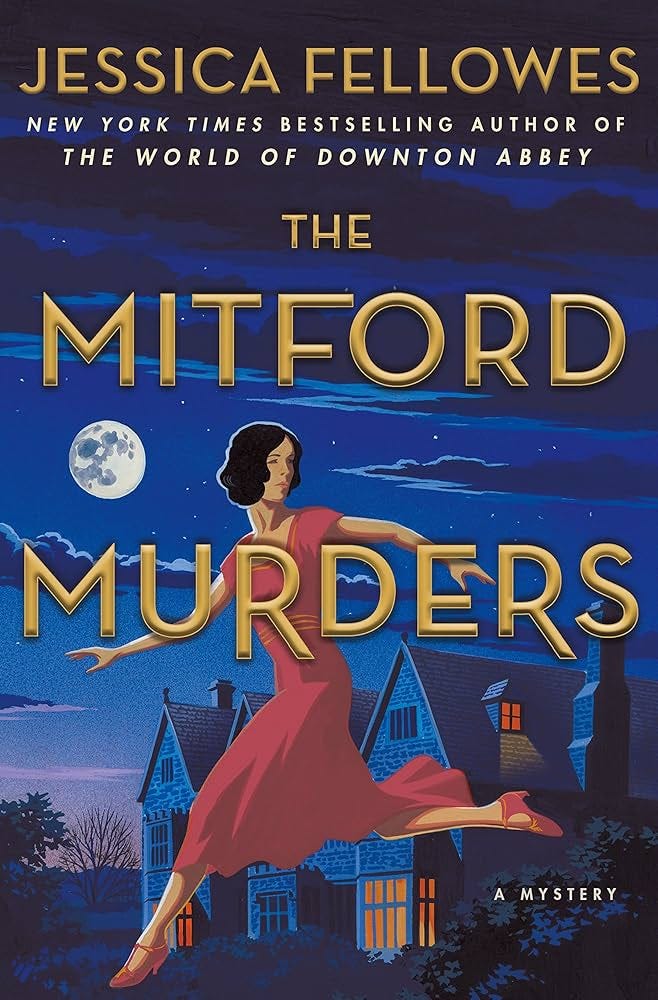

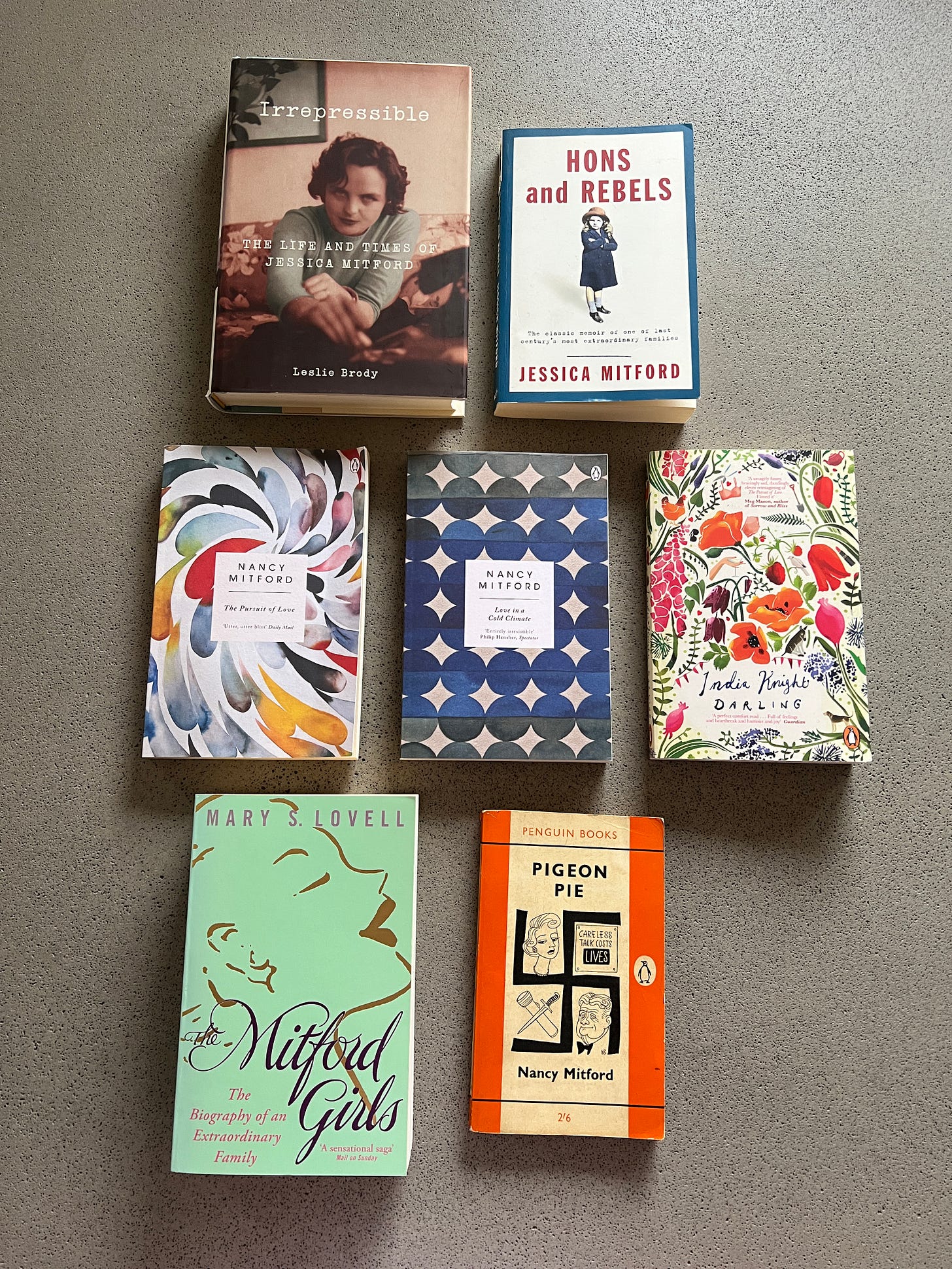
This sounds so interesting! Thanks for introducing me to the Mitford sisters.
Thanks for this, Danielle! Didn’t realise this was out now. What an extraordinary - and outrageous - family there were!